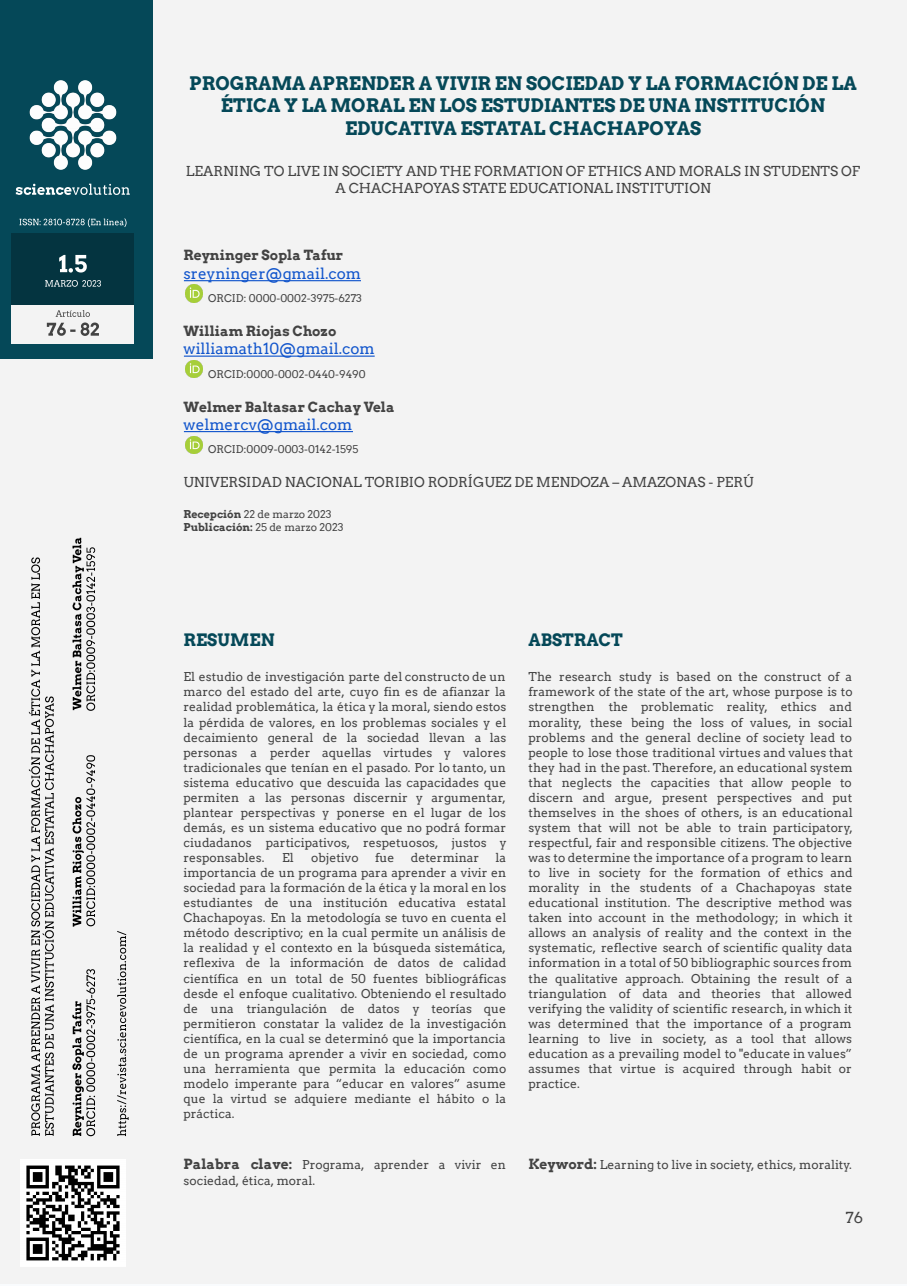Abstract
The research study is based on the construct of a framework of the state of the art, whose purpose is to strengthen the problematic reality, ethics and morality, these being the loss of values, in social problems and the general decline of society lead to people to lose those traditional virtues and values that they had in the past. Therefore, an educational system that neglects the capacities that allow people to discern and argue, present perspectives and put themselves in the shoes of others, is an educational system that will not be able to train participatory, respectful, fair and responsible citizens. The objective was to determine the importance of a program to learn to live in society for the formation of ethics and morality in the students of a Chachapoyas state educational institution. The descriptive method was taken into account in the methodology; in which it allows an analysis of reality and the context in the systematic, reflective search of scientific quality data information in a total of 50 bibliographic sources from the qualitative approach. Obtaining the result of a triangulation of data and theories that allowed verifying the validity of scientific research, in which it was determined that the importance of a program learning to live in society, as a tool that allows education as a prevailing model to "educate in values” assumes that virtue is acquired through habit or practice.
References
Arendt, L. (2018) Studies in the nature of character. Vol 1. Studies in deceit. New York: Macmillan
Bárcena, J. y Melich, C. (2019) How Not to Teach Values. A Critical Look at Character Education. Phi Delta Kappan. 429-439
Carbonell, M. (2018) Corrupción, democracia y responsabilidad política. México: Editores Siglo XXI, S.A.
Dewey, J. (1934) Los principios morales que cimentan la educación. Madrid: Espasa Calpe
Gadamer, H. (2017) Educar es educarse. Barcelona: Paidós Ibérica
Graciani, M. (2018). ¿Cuál es el valor de una persona? El Correo de Andalucía. https://elcorreoweb.es/opinion/columnas/cual-es-el-valor-de-una-persona-YA4442881
Miró Quesada, F. (2019). Ciencia política de la liberación. Primera parte. Universidad Ricardo Palma.
Martínez, M. y Tiana, A. (2017) Educación, valores y cohesión social. Ginebra. p. 2-21. Taller 2: Calidad de la educación e inclusión social. Ponencia en la Cuadragésimo Séptima Conferencia Internacional de Educación. http://www.ibe.unesco.org/International/ICE47/Spanish/Organisation/Workshops/Background%20at-2-ESP.pdf
Puig, J. (2019) La educación moral en la escuela. Barcelona: Edebé.
Pérez de Cuellar, J. (2017) La nostra diversitat creativa. Informe de la Comissió Mundial sobre Cultura Desenvolupament. Barcelona: Centro UNESCO de Catalunya.
Rojo, G. (2022) Essays on moral development. Vol 1: The philosophy of moral development. San Francisco: Harper and Row
Spinoza, B. (2019) Tratado Político. Madrid: Alianza Editorial.
Torroella, G. (2017) Torroella, G. Educación para la vida: el gran reto. Revista Latinoamericana de Psicología, Bogotá: Fundación Universitaria Konrad Lorenz, v. 33, n. 1
Taille Y., (2017) educação moral: Kant e Piaget. In: Macedo, L. (Org.). Cinco estudos de educação moral. São Paulo: Casa do Psicólogo. p. 135-176.
Valdiviezo, (2018) “Globalización, género y patrón de poder”, En: Alicia GIRÓN (Coord.), Género y globalización, pp.27-52, 1ª ed. Buenos Aires: Consejo Latinoamericano de Ciencias Sociales -CLACSO.
Vidal, M. (2019) La moral cristiana hoy”, en Iglesia Viva (155) 510-527
Zaraya, D. (2018) Zaraya, D. Os combinados em sala de aula: uma prática construtivista para a legitimação moral dentro da escola. Trabalho de Conclusão de Curso (Pós-Graduação em Ética, Cidadania e Valores na Escola) — Universidade de São Paulo, São Paulo.
Zambrano, F. (2020) El aprendizaje a lo largo de toda la vida desde una perspectiva de justicia social. París: UNESCO. Serie de documentos temáticos sobre Investigación y Prospectiva en Educación, n. 21. https://es.unesco.org/node/262744
Zapata, N. (2017) Pedagogía axiológica. La educación ante los valores. Madrid: Dykinson

This work is licensed under a Creative Commons Attribution-NonCommercial-NoDerivatives 4.0 International License.
Copyright (c) 2023 http://revista.sciencevolution.com/

